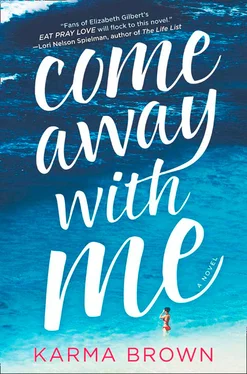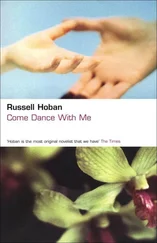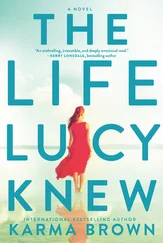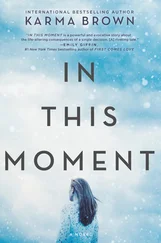“You need to relax, my love.” Gabe takes his right hand off the wheel and rests it on my knee briefly, before sliding it up my thigh. His calloused palm—rough from sanding the antique cradle he’s been refinishing, the one I slept in as a baby—scratches against my tights as it works its way along my thigh. The bottle of wine tumbles off my lap.
“Gabe!” I laugh and playfully swat at him. I right the wine bottle and place it between my suede winter boots on the floor. “Get your hand back on the wheel. If this bottle breaks, you’re done for.”
But he keeps his hand where it is. “Trust me,” he murmurs, his smile widening. “This will do the trick.”
“We’re almost there,” I protest, pressing my hand down hard on his, temporarily stopping its climb. “Let’s save this for later, okay? When we’re not late and you’re not driving.”
“Don’t worry, I’m an expert one-handed driver,” he says, inching his hand higher despite my efforts. “Besides, I don’t want you going into my parents’ house all wound up. You know how my mom smells fear.” He turns and winks at me, and I melt. Like always.
His fingers hook the thick waistband of my tights, which sit just underneath my newly swelling belly, and I stop protesting.
Rockin’ around the Christmas tree...have a happy holiday...
My breath catches as Gabe’s fingers work their way past the waistband and into my not sexy, but quite practical, maternity underwear. I look over at him but he stares straight ahead, a smile playing on his lips. I close my eyes and lean my head against the headrest, as Gabe’s hand moves lower...
Then, suddenly, too much movement in all the wrong directions. Like riding a roller coaster with closed eyes, unable to figure out which turn is coming next. Except there’s no exhilaration—only panic at the realization Gabe no longer has control over the car. The tires lose their grip on the road and Gabe’s fingers wrench from between my legs. I gasp out his name and brace my hands against the edges of my seat. We fishtail side to side, and for a moment it seems as though Gabe is back in control. I allow myself a split second of relief. One quick thought that being late to dinner isn’t the worst thing that could happen, after all. An instant to contemplate how lucky we are.
Then, with a sickening lurch, the car swerves. The momentum is so great it tosses me sideways like a rag doll, and my head cracks against the window. Stars explode behind my eyes, mingling with the lampposts’ twinkle lights and creating a dizzying kaleidoscope. I feel like I’m watching a lit Ferris wheel, spinning high in the night sky.
As our car smashes into the lamppost, steel meets steel and everything slows down. I wonder if the bottle of wine will be okay. I think that at least now we have a good excuse for being late for dinner. And I’m amazed the radio continues playing, as if nothing has changed.
After the impact comes the shriek of metal as our sturdy car rips practically in two. And still, the music plays. When the airbag explodes into my face and chest I worry I may suffocate. But then a rush of pain, deep and frightening, crushes my belly—where the most important thing to both of us is nestled—and it takes my breath away.
Seconds later, everything goes quiet.
I try to call out for Gabe, but have no air left to make a sound. With my left hand I reach out, hoping to feel him beside me. I need to tell him something is wrong. My head hurts terribly.
He’ll know what to do.
But there’s nothing beside me except cold, empty space.
Then I realize it’s snowing inside the car.
We will not be lucky this time.
3
The biscotto shatters into a million pieces, the butter knife clanging against the fine china plate I’d planned to use for Christmas dinner. Back when I was looking forward to Christmas. Or to anything. Staring into the crumbs, I realize how closely they resemble my life. No one piece big enough to be satisfying; too many that even if you try to gather them all, a few will be left behind. Lost forever in the cracks.
“I don’t know why you insist on trying to cut that stuff.” Gabe leans against the doorjamb between our kitchen and the hallway.
“Because I only want half,” I say. “Why do they have to make them so damn long?”
“So you don’t burn your fingers when you dip them in your coffee,” he replies, shrugging. Obviously , his expression adds, though he doesn’t say anything out loud.
I sigh, tucking a stringy piece of dark hair behind my ear. “Why are you still here anyway?” It’s two o’clock in the afternoon on a Wednesday, the middle of a workday. It’s been a long time since I went to work, nearly three months. I pick up a small chunk of the broken biscotto and dip it in my coffee, appreciating the hot liquid’s burn against my skin. Physical pain is good. It dulls the ache that won’t leave my chest.
Gabe moves into the kitchen and sits on the empty stool beside me at the island. “I live here,” he says, his tone purposefully light. He’s trying to bring a smile to my face, I know, like he used to so easily.
The soggy corner of the cookie falls from my fingers and disappears below the surface of the coffee. “Besides, you need me,” he adds with a resigned sigh. “I’m not going anywhere.”
I look back into my mug, oily dots popping to the surface, and grab another piece of biscotto. My mother-in-law, Rosa, brought it over earlier, a whole tray’s worth, because she believes eating dilutes grief. But the cookies are Gabe’s favorite, not mine. To be honest, I don’t much care for them although I didn’t have the heart to tell his mom. Especially not now.
I put the thick, crusty cookie on the plate and pick up the knife again. Gabe raises an eyebrow but I ignore him, cutting the piece in half, once again unsuccessfully.
My mother bustles into the kitchen and I glance up at the stack of tiny folded blankets, covered in green turtles and fuzzy brown teddy bears, she holds in her arms. “What would you like me to do with these?” She looks uncomfortable to be asking the question, even though I’ve asked her here specifically to help pack up the nursery—something Gabe and I are incapable of facing alone.
“Get rid of them, please,” I say as if I’m talking about tomato soup cans in our trash bin. “Give them away or something.”
My mom opens her mouth, then closes it as she fingers the fine, muslin blanket on top of the pile—the one I imagined swaddling our son in before rocking him to sleep. “I could just put them in storage, until you’re sure.”
“No,” I say, shaking my head. The air in the kitchen is charged with tension. No one knows how to deal with me these days; I can’t say I blame them. If I could escape my body and mind, I wouldn’t look back. “Give them away. Or throw them out. I don’t really care, as long as they’re gone.”
“Are you sure?” Gabe asks. He looks sad. But I’m sure I look worse. I tuck my hair behind my ear again, smelling how long it’s been since my last shower.
My mom hasn’t moved. She’s standing on the other side of the island and staring down at the blankets, sweeping her hands across the top one to try and straighten out the wrinkles. It occurs to me she imagined wrapping her grandson in that blanket, too.
“Get rid of them,” I say with an edge this time. But I keep my eyes on Gabe, who has gotten up and is now standing beside my mom. I’m challenging him to argue. “Please don’t make me say it again.”
“Okay, hon, okay,” Mom says, looking apologetic before leaving us to finish the conversation I don’t want to have.
“I’m sorry, Tegan.” Gabe’s voice carries a sadness I understand but don’t want to deal with.
Читать дальше












